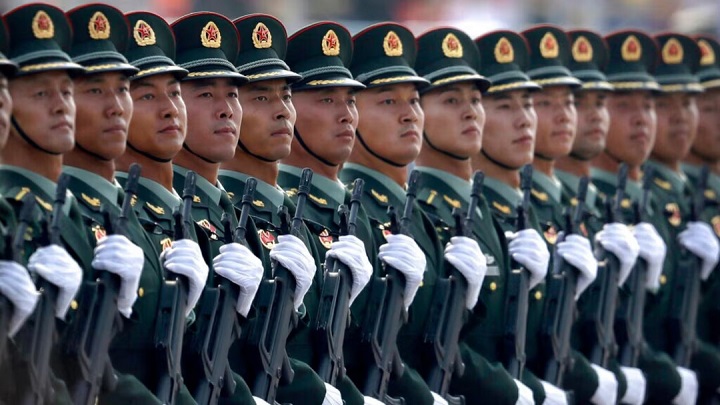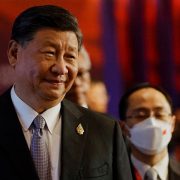
The PLA’s chest-thumping in Europe and America after NATO’s claims may hide the impact of the recent military purge. Military, not economy, could dominate the next Party plenum.
China defiantly called on military drills with Russia, a nation at war in Ukraine, after NATO called Beijing “enabler” of Moscow’s war effort and Japan warned of spillover effects. “The joint exercise aims to demonstrate the resolve and capabilities of the two sides in jointly addressing maritime security threats and preserving global and regional peace and stability,” the ministry said on Friday, adding that it would “further deepen the China-Russia comprehensive strategic partnership of coordination for the new era”.[1]
For the first time in its history, the Chinese People’s Liberation Army (PLA) sent troops for military exercises in Europe. They went to Belarus, near the border with Ukraine, where war against Russia (Belarus’ ally) is raging. The exercises were not conducted with Russian troops, and Belarus is trying to avoid being fully involved on Moscow’s side. Still, it is evidently a Chinese signal against NATO, which at the July 10 Washington summit minced no words about China.
The People’s Republic of China’s (PRC) stated ambitions and coercive policies continue to challenge our interests, security, and values. The deepening strategic partnership between Russia and the PRC and their mutually reinforcing attempts to undercut and reshape the rules-based international order, are a cause for profound concern. We are confronted by hybrid, cyber, space, and other threats and malicious activities from state and non-state actors…
The PRC has become a decisive enabler of Russia’s war against Ukraine through its so-called “no limits” partnership and its large-scale support for Russia’s defense industrial base. This increases the threat Russia poses to its neighbors and to Euro-Atlantic security. We call on the PRC, as a permanent member of the United Nations Security Council with a particular responsibility to uphold the purposes and principles of the UN Charter, to cease all material and political support to Russia’s war effort. This includes the transfer of dual-use materials, such as weapons components, equipment, and raw materials that serve as inputs for Russia’s defense sector. The PRC cannot enable the largest war in Europe in recent history without this negatively impacting its interests and reputation…
The PRC continues to pose systemic challenges to Euro-Atlantic security. We have seen sustained malicious cyber and hybrid activities, including disinformation, stemming from the PRC. We call on the PRC to uphold its commitment to act responsibly in cyberspace. We are concerned by developments in the PRC’s space capabilities and activities. We call on the PRC to support international efforts to promote responsible space behavior. The PRC continues to rapidly expand and diversify its nuclear arsenal with more warheads and a larger number of sophisticated delivery systems. We urge the PRC to engage in strategic risk reduction discussions and promote stability through transparency. We remain open to constructive engagement with the PRC, including to build reciprocal transparency with the view of safeguarding the Alliance’s security interests. At the same time, we are boosting our shared awareness, enhancing our resilience and preparedness, and protecting against the PRC’s coercive tactics and efforts to divide the Alliance.[2]
To stress the point, Washington also invited Australia, Japan, South Korea, and New Zealand to the summit, all of whom are more concerned about China than Russia. However, the statement stopped short of calling China a Russian ally, a label cast on Iran and North Korea.
At the same time, the PLA deployed surface action groups into America’s Exclusive Economic Zone (EEZ) in the Gulf of Alaska, led by its newly minted aircraft carrier Shandong—the group passed by Japan, delivering a message to Tokyo. Japan considers Taiwan, an island Beijing regards as “rebellious,” within its strategic domain. Tokyo is discussing a defense treaty with the Philippines, embroiled in a heated dispute with Beijing over the South China Sea.
A third delicate element is the news that former defense minister Wei Fenghe is accused of “treason,” having trespassed the bounds of loyalty 忠诚失节. This is a severe charge, unprecedented in PLA history, potentially indicating an espionage act (has he passed information to a foreign power?) or an attempted revolt, a coup. The accusation suggests that the Chinese armed forces are compromised and unstable. It is unclear why the government decided to make these charges public instead of covering them up, as is usually done in China, where political faults are mostly hidden behind the vague and all-encompassing tag of “corruption.”
The fact that President Xi Jinping can conduct such a radical purge of the armed forces without opposition and before a Party Plenum proves his clout. At the same time, launching operations of military projection (in Belarus and the Pacific) shows his full control over the PLA. It suggests that the purge has not affected the PLA’s military capabilities.
Xi’s political control over the PLA is credible because it is factual. There have been no uprisings after the purge, and the two missions prove that troops follow orders. However, the purge of so many generals and the eerie accusation of “disloyalty” could shake the PLA’s reliability, at least in the short term.
In a country where official news tells just the party line, information is passed by confused and contradicting gossip, and Beijing is rife with it, sowing uncertainty among the ranks and file. One recently claimed that Madame Xi Peng Liyuan was interviewing generals for their top positions. She is a general in the PLA performing art group but has no formal senior army or party post. Given the Party’s strict discipline procedures, it seems unlikely, but it’s hard to dismiss given the very secretive nature of all actual trials.
Moreover, with the unclear nature of Wei’s actual fault, officers can be very uncertain about what to do or not to do. Consequently, they can become passive and not proactive in the face of growing national security concerns. This behavior could become a liability in an environment where challenges can come from all fronts, and nothing is certain.
The country believes that the economy is “the hard reality,” but “power comes from the power of the gun;” thus, security concerns will likely trump economic woes in the party plenum scheduled to be held in the next few days. In all of this, there is the conundrum – money makes an army move, and PLA’s ambitions (or fears) need a lot of it, and money comes not from Russia, Iran or North Korea but from trading with Western countries that are on a collision course with China. So far, China tried to work around the conundrum, but it’s unclear how long this tactic could work and if and how Beijing plans to solve it.
The conundrum adds to PLA’s uncertainty “damn if the PLA is strong, worse if the PLA is weak” as we noted before[3], and China’s present defiance to NATO accusations seems to confirm our past assessment.
- In collaborazione con l’Appia Institute.





